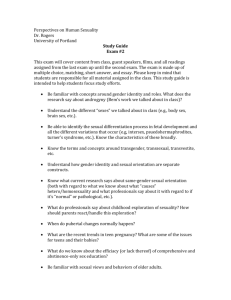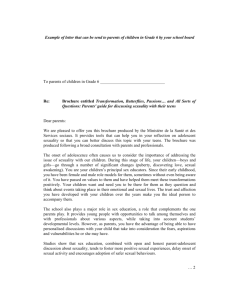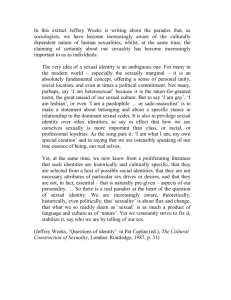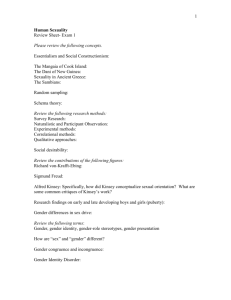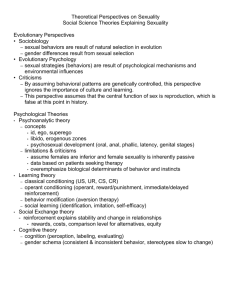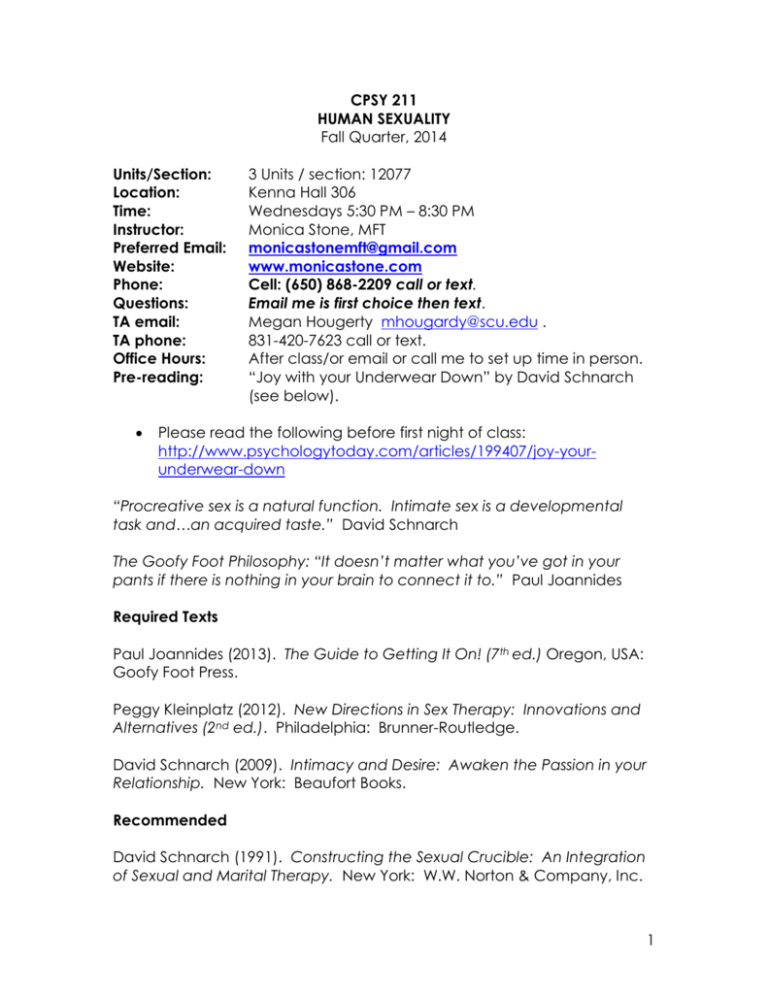
CPSY 211
HUMAN SEXUALITY
Fall Quarter, 2014
Units/Section:
Location:
Time:
Instructor:
Preferred Email:
Website:
Phone:
Questions:
TA email:
TA phone:
Office Hours:
Pre-reading:
3 Units / section: 12077
Kenna Hall 306
Wednesdays 5:30 PM – 8:30 PM
Monica Stone, MFT
monicastonemft@gmail.com
www.monicastone.com
Cell: (650) 868-2209 call or text.
Email me is first choice then text.
Megan Hougerty mhougardy@scu.edu .
831-420-7623 call or text.
After class/or email or call me to set up time in person.
“Joy with your Underwear Down” by David Schnarch
(see below).
Please read the following before first night of class:
http://www.psychologytoday.com/articles/199407/joy-yourunderwear-down
“Procreative sex is a natural function. Intimate sex is a developmental
task and…an acquired taste.” David Schnarch
The Goofy Foot Philosophy: “It doesn’t matter what you’ve got in your
pants if there is nothing in your brain to connect it to.” Paul Joannides
Required Texts
Paul Joannides (2013). The Guide to Getting It On! (7th ed.) Oregon, USA:
Goofy Foot Press.
Peggy Kleinplatz (2012). New Directions in Sex Therapy: Innovations and
Alternatives (2nd ed.). Philadelphia: Brunner-Routledge.
David Schnarch (2009). Intimacy and Desire: Awaken the Passion in your
Relationship. New York: Beaufort Books.
Recommended
David Schnarch (1991). Constructing the Sexual Crucible: An Integration
of Sexual and Marital Therapy. New York: W.W. Norton & Company, Inc.
1
Also highly recommended:
Jack Morin (1995). The Erotic Mind: Unlocking the Inner Sources of Passion
and Fulfillment. New York: Harper Collins.
Course Description
Sexual meaning and sexual intimacy are given as organizing frameworks
for examining human sexuality, with special attention to understanding
the diversity of sexual beliefs, attitudes, and behaviors within differing
contexts. The course emphasizes using sexual difficulties for
psychological development. There is some biological knowledge
included, but not emphasized. The course includes practical application
(via case studies, group presentation and role play) for the promotion of
healthy sexual development and satisfaction for CPSY students and their
clients.
Course Objectives
This course is designed to: (1) provide information and perspective to you
as future therapists regarding biological, developmental, behavioral,
emotional, psychological, and cultural aspects of human sexuality; (2)
broaden knowledge and awareness of, and tolerate and reduce anxiety
around, a wide range of human sexual expression; (3) develop comfort
for each class member with his/her own sexuality; (4) increase comfort
and skill level in discussing a wide variety of sexual concerns.
Upon completion of the course, students will:
1. Articulate their own sexual values in relation to those of others.
2. Maintain an appropriate academic distance and/or professional
tolerance toward diverse sexual values and behaviors that differ from their
own--culturally or otherwise.
3. Describe the systemic relationship between sexuality and other
problems.
4. Recognize and have information about typical sexual problems
experienced over the human life cycle, particularly in the context of
family and other close relationships.
5. Support the development of families that promote healthy sexual
development.
6. Articulate the differences between existing models of sex therapy
(including psychodynamic, behavioral, systems and differentiation
theory).
2
Course Agenda and Homework/Reading Assignments:
9/24 Class 1 - Introduction and Logistics Week: “The Myth of the Normal”
Please read the following article before this first class: “Joy with your
Underwear Down” by David Schnarch at the following URL:
http://www.psychologytoday.com/articles/199407/joy-yourunderwear-down
Video: Accepting Sexuality and Intimacy if You’re Merely Human
by David Schnarch. We will watch this in class--it is also available in
media services.
Create groups for role plays and presentations.
Discuss the Schnarch video and role play in these small groups.
Case study and Role Play: “Tony and Tina”: Skill 1 - Establishing and
Maintaining an Effective Focus.
Discuss response papers (syllabus pages 6-7) and use of file folders.
1st response paper due next week, see below.
10/1 Class 2 - History Week: History of the Study of Sexuality, Sex
Education and Sex Therapy
Homework: Response paper 1 is due. (Please read the syllabus for
a complete explanation of the response papers pp. 6 & 7. Leave in
your file folder at the end of the class session.)
Homework before class:
Camino: Listen to Leonore Tiefer: “The McDonaldization of Sex”.
Readings:
The Guide: Sex Ed: chpts. 58-65; hx: 67-68; 74;
Schnarch intro + chpt. 1, 2 + Appendix A;
Kleinplatz: Intro (xix), “Part 1”: pages 1-4, Chpt. 7: pp. 101-116;
Class sharing and review/personal responses to material.
Powerpoint conversation: History of Sex Education & Sex
Therapy/Integration with Systemic Marital Therapy.
Video: Kinsey documentary (segment).
Case study: “James”: Skill 2 – Assessing the Client’s Will and Staying
out of Giving Advice.
Discuss course syllabus and “sexual script” exercise (due next week).
3
10/8 Class 3 - Treating Sexual Desire Discrepancy using Systems Theory:
Homework: “Sexual script” (2nd response paper) is due. Essay from
the questions in the “Sexual Script” document in your file folder and
on Camino.
Readings before Class:
Schnarch: chpt. 3,4.
The Guide chpt. 39, 59.
Kleinplatz: chap. 9, 11.
Camino: Chapters listed under Module 3.
Power point discussion: “Desire Discrepancy: The Common Cold of
Marriage”.
Case study: “Adam and Eve”. Skill 3: Identifying the underlying
systemic pattern or dialectic using a specific example of the
problem.
Class sharing on responses to material.
10/15 Class 4 - Working with Sex Addiction and Affairs:
Response paper 3 is due.
Listen to David Schnarch audio file on Camino: “Treating Extramarital Affairs.”
Readings:
The Guide: Chpts. 29, 30, 32, 38.
Schnarch: chpts. 5,6.
Kleinplatz: chpt. 5, p. 69-81.
Camino: “Integrating ISTDP and Sex Therapy” Module 4.
Speaker: David Marcus PhD on “Treating Sexual Acting Out” 6PM7PM
Skill 4: Identifying the “Triangle of Conflict”.
Skill 5: Blocking Externalization.
Discuss Final Papers and Presentations.
4
10/22 Class 5 - Biology and Male Dysfunction Week: Anatomy and
Physiology of Male Sexuality and the Development of Sexuality over the
Lifespan. (After break, we will meet in Kenna Hall 102 with Holly Osment’s
class for our speaker.)
Response Paper 4 due.
Color in one male anatomy drawing from the anatomy drawings on
camino Module 5. Color it in (anyway you like), turn it in for 1 point.
Readings:
The Guide chpt. 17, 18, 20, 22, 49, 54, 55.
Schnarch chpt. 7. 8 & Appendix B;
Kleinplatz chpt. 3.
In class: Watch “You Can Last Longer” training video for behavioral
treatment of rapid ejaculation (5:45-6:15).
Case: Treating a gay or lesbian couple.
Guest presenter: Ed Karpman, MD (7:00-8:30 PM)
Discuss Sexual Autobiographies, due week 10.
10/29 – Class 6: Female Sexual Dysfunction and Female Sexual Pain
Week/Also Treating Trauma using Sexuality.
Response Paper 5 is due and….
Color in a female anatomy drawing from Camino Week 6. Turn it in
for 1 point.
Readings:
The Guide chap. 7, 8, 10, 12, 16, 21, 48, 50, 51, 58, 60, 61, 62;
Schnarch chpt. 9. 10.
Kleinplatz chap. 16, 20.
Watch Orgasm Inc. on Netflix at home.
In Class: Watch Betty Dodson’s video on women’s sexuality groups
(6:30 - 7PM).
Mary Buxton, LCSW presents on female sexuality 5:45-6:30 PM.
2nd Topic: Treating Trauma using Sexuality.
Power point conversation: “Trauma and the Elicitation Window”.
Practice seeing into sexuality via asking about initiation and
foreplay.
Skill Exercise in Dyads practicing this skill.
11/5 Class 7 – Other treatments for Sexual Problems: Sexual Surrogacy
and Physical Therapy for female sexual pain. (After break we will meet in
Kenna Hall 102.)
Response paper 6 and female anatomy drawing are due.
Readings:
Schnarch 11, 12.
Denise Alberto Physical Therapy for Female Sexual Pain: 5:45-6:30.
5
Cheryl Cohen Green and Danielle Harel: (played by Helen Hunt in
movie: The Sessions) and Daniel Harel (creator of the Somatica
Method).
7:00 – 8:15 PM
11/12 Class 8 - LGBT Community Week *We will meet in Kenna 102 tonight!
All response papers and anatomy drawings must be turned in.
Listen:
Listen to “81 Words” from ITunes, download for $.99 or for free
listen to it at the following URL:
http://www.thislife.org/Radio_Episode.aspx?episode=204
Listen to “Two Families Grapple with Son’s Gender URL:
Preference”: http://www.npr.org/2008/05/07/90247842/twofamilies-grapple-with-sons-gender-preferences
Readings:
Schnarch chpt. 13,14.
Presenters/Panel Members: Panel 1 5:30-6:45 : Therapy with lesbian,
gay or bisexual clients: Amy Caffrey, Andrea Lewak, Nicolas
Castellanos.
Panel 2: Judy Van Maasdam and Trans or Gender Queer Folks 78:15 PM:
11/19 Class 9 - Group Presentations.
Reading: Schnarch 13,14.
5:40 - 6:10 PM Group 1
6:15 - 6:45 PM Group 2
6:45 – 7:00 PM BREAK
7:10 – 7:40 PM Group 3
7:50 – 8:20 PM Group 4
11/26 No Class Meeting – Thanksgiving Eve!
12/3 Class 10 - Class Wrap-up
Sexual Autobiography due at 5:30 PM or before.
Role plays using skills gained during class.
Videotapes and discussion of my work.
Class discussion, questions, etc.
Complete Course Requirements / Grading Criteria Below:
96-100 pts. = A
90-95 pts. = A85-89 pts. = B+
6
80-84 pts. = B
75-79 pts. = C
A. Class participation ………………………………2 pts. X 10 weeks = 20 pts.
My appraisal of each student’s level of involvement in class. and in
discussions, and my records of attendance and punctuality: up to 20 pts.
possible. Missing one class during the quarter (or two half classes) will not
affect your grade. Keep in mind that you may be sick during the quarter
and have to miss a class so be careful. Missing 2 classes or being
chronically late will bring your grade down one full grade: i.e. A to B or Ato B-, etc. (Missing 3 or more classes will result in an incomplete.) This
portion of your grade will also depend on how often and how much you
speak up during class.
B. Weekly, self-reflection papers........................... 6 papers X 3 pts = 18 pts.
Choose, reflect and write about a reading assignment, classroom
experience or concurrent life experience that stands out or is relevant to
YOU and to your learning in the class. The purpose of this paper is to
encourage self-reflection and personal growth. It is not intended to be
abstract or impersonal, nor a place to discuss theory or philosophy (see
below).
1. The first paragraph: Briefly describe the choice of reading, class
experience and/or current event in your life.
2. The remainder of the paper: Focus on your personal responses to 1.
(feelings, anxiety, defenses, meanings, experience, and/or reactions) and
what you have learned about yourself as a result. For example, why did
you choose this event, topic or situation for this reflection paper and what
about it has meaning for you? If you have stretched, grown or expanded
your thinking or comfort in some way, please talk about how. Please use
examples and be as specific as possible. These papers will be kept
completely private and confidential and read only by me. They will be
graded as part of your overall grade as follows:
3 point paper will include:
1. Clear and proofread grammar and writing; appropriate length (1-3
pp. only).
2. Page numbers on the pages and also labeled “reflection 1” up to
“reflection 6”
3. Concrete examples from personal experience of concepts and
course material.
4. Clearly and concretely how you have grown or learned from item
3, above, or how you haven’t grown or learned.
7
2 point paper indicates that one of the above attributes is missing.
1 point paper indicates that, although you did complete the paper, more
than one of the above attributes is missing.
Each reflection paper will be a minimum of one full page and a maximum
of 3 pages (11-12 pt; double-spaced). Your second assignment will be the
sexual script you receive in your folder (or download from Camino) the
second session. Papers are due each week, beginning week 2 (10/1/14)
and ending week 8 (11/12/14). I will not accept any reflection papers on
weeks 9 during class projects or week 10, the final class, when you turn in
your final paper. Please don’t turn two papers in during one week. You
can skip one week and still get all 6 papers turned in by week 8.
In addition to the sexual script and the 6 reflection papers, prior to the
male and female sexuality class nights you are asked to download and
“color in” an anatomical page from the old Camino site for the class (one
male, one female anatomical drawing). These are additional and not
graded for quality of coloring, but given one point each upon completion
in folder.
You may also have one “late” paper or anatomical drawing without
penalty and without notifying me. More than one missed / late paper will
be reflected in your final grade. (A paper is considered “late” after the
beginning of each class. Make sure you submit it to Camino before class.
C. Small Group Projects/Presentations---------------------------------30 pts.
You will be assigned to a small group (4-5 students) at the beginning of
the course. At various times during the course, there will be activities,
discussions and role-plays in these groups. You will create a final project
presentation with your group for the class. (See week 9: November 19,
2014.)
The following topics are possibilities for the group presentations/projects:
1.
2.
3.
4.
5.
6.
7.
8.
Anorgasmia
Rapid Ejaculation
Delayed Ejaculation
Sexuality and Aging
Sexuality and Disability
Sexuality and Cultural Issues
Body Image and Sexuality
Marriage counseling when presenting problem is one
partner has decided to come out as gay.
8
9. Effects of pornography on sex education and sexual
development.
10. Tantra
I am open to other topics (see me). Description continued below.
Read the following carefully: Your group task is to create a presentation
that will inform yourselves and the rest of the group about these topics.
The presentations will give you a chance to look more deeply into a
particular sexual difficulty or area of sexuality and its treatment possibilities
or practice modality, particularly one that has not been thoroughly
covered in class or our readings.
You will present your research on the topic to the class, select a model for
treatment (cognitive behavioral, crucible model, object relations,
existential, narrative, any model of psychotherapy you choose) and
describe and create a role play displaying how that treatment would be
carried out in counseling.
The group presentations should last 30 minutes and involve all group
members in some portion of research, collaboration, and presentation.
The presentations can be in any form, but must include a role play; other
creative additions are also welcome. Do not bore us!
Most of all, make sure your presentation is interesting and maintains the
attention of the class. You will only turn in a list of your sources and
references, plus a description of each member’s contribution to the group.
You may create a handout for the class if you wish, but that is not
necessary.
You will be given a small amount of class time to work on these projects,
but you will most likely need to meet and work on these projects outside
of class time as well. More details will be discussed during the second class
meeting. Your presentation will be graded according to the requirements
below:
Group Project Grading
Grade determined by the following metrics (0-6 pts per category, total 30
points). Does the presentation show an understanding of the topic
demonstrated through the following criteria? Each student in the group
will receive the same number of points.
1. Quality and organization of research, shown through contents of
bibliography and quality of presentation.
9
2. Understanding of the selected model for treatment: choose
cognitive behavioral, systemic, behavioral, narrative etc. and
describe verbally during the didactic piece of the presentation
how that treatment orientation would be carried out.
3. Role Play: Does the role play display the treatment model shown?
4. Delivery of the presentation: Is it clear, organized and creative?
Shown through the presentation, role play and other parts of the
presentation.
5. Teamwork: does each member have a demonstrated
participation without dominating the presentation? Shown by
watching and by reading what you turn in listing each team
member’s participation.
D. Final paper-------------------------------------------------------------30 pts.
Details to be discussed further in class.
Your final paper will be an 8-10 page sexual autobiography. I expect the
following to be explored in depth:
1. Describe chronologically your sexual past and present, when did
you first notice your own genitals? When did you start
masturbating? When did your parents first talk to you about sex,
or did you notice them not talking to you about sex, etc. to the
present. When did you become sexually active with someone
else, etc. (1-6 pts.)
2. Describe your personal sexual aspirations for your future, what do
you want for yourself in your sexual or erotic life? How are you
going to achieve that? 1-6 pts.)
3. What kinds of meaning does your sexuality have for you?
Meaning can come in many forms. If possible and if it makes
sense to you, use the “elicitation window”™ to look at the ways
that your sexual self (including specific behaviors) show you a
picture of your past, your present and perhaps your future. (1-6
pts.)
4. How might your past and present impact your clinical work in the
future? What will you watch for in your clients, what issues will
you choose not to treat, what might be particularly interesting to
you in the clinical areas of sexual difficulties or sexual potential?
Use examples of how you might apply your new understanding
of self to your future counseling or therapy practice. (1-6 pts.)
5. Paper should be professionally written, carefully proofread, and
well written and organized. (1-6 pts.)
10
Your grade on this final paper will also be determined by my assessment
of your overall depth of understanding that your paper demonstrates.
This paper is due at the start of the last class, December 3, 2014. It is the
only paper you will submit that evening (either electronically before class,
or a hard copy in class). Please remember to include a self-addressed
stamped envelope (SASE) if you would like a hard copy of the paper
returned to you. Thank you.
And a final thought from David Schnarch, “Changing the way we have sex
is the gut-wrenching task of changing the stories of our lives.”
11


